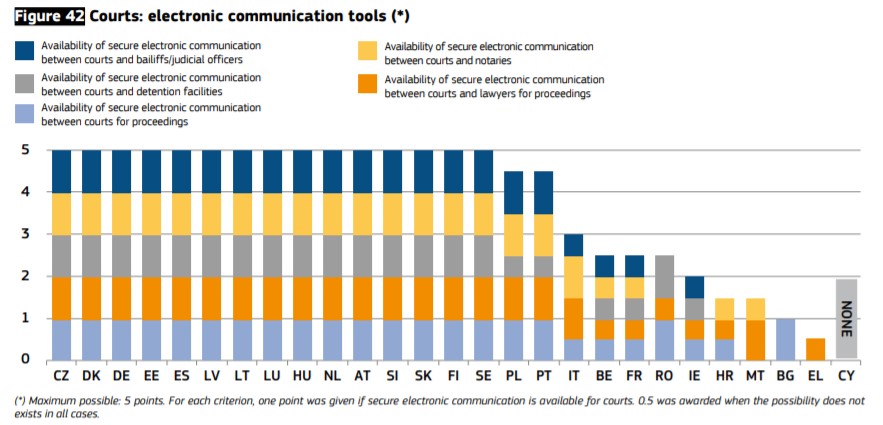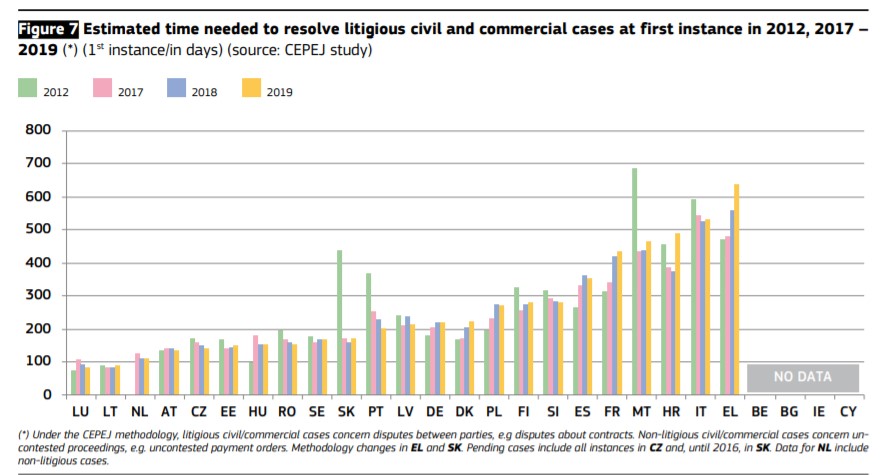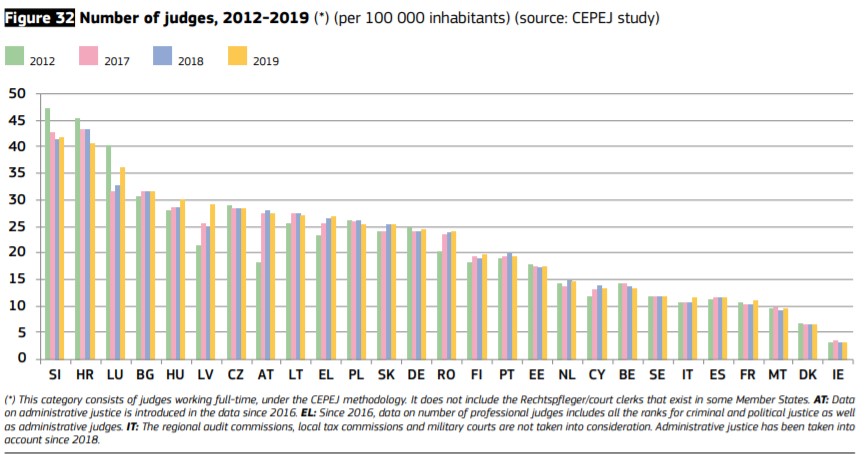The European Commission 2021 Rule of Law Report Country Chapter on the Rule of Law Situation in Malta
According to the 2021 Rule of Law Report Country Chapter on the Rule of Law Situation in Malta, Malta has made significant progress within the domestic justice system particularly with regard to the reform of judicial appointments and judicial discipline, and also the appointment of the Chief Justice, in fact the level or perceived independence has increased and this in view of enhancing judicial independence and subsequently facilitating access to justice. The main legislative changes that addressed these issues were highlighted in another post Venice Commission: regrets that 6 Bills adopted before opinion could be finalised, before it could engage with the national stakeholders.
In spite of these improvements Malta has, ‘registered a significant deterioration in perceived corruption levels’ due to the increased level of corruption within the public sphere. Moreover, certain areas fall short of the necessary standards as envisaged by the European Union such as the transfer of prosecutions of less serious offences from the Police to the Attorney General and other areas which are of serious concern such as the lack of efficiency of the justice system, the non-applicability of the erga omnes principle of constitutional court judgements and the gaps in the digitisation of the justice system.

1. Appointment of the Judiciary
The Report commends certain reforms and measures implemented including the procedure of judicial appointments and the formulation of the new composition of the Judicial Appointments Committee (JAC) as well as the procedure for the dismissal of magistrates and judges which now falls within the remit of the Commission for the Administration of Justice. These changes provide for additional guarantees, which include the publication of vacancies, the proposal of candidates to the President and the submission of detailed reports by the JAC.
However, it also highlights the fact that throughout these reforms, the Maltese Government did not allow for public consultation, a key to any democratic society, this issue was raised by aditus foundation in the feedback to DG Justice April 2021 and that certain measures have not been taken into consideration throughout these reforms.
The Report therefore recommends that in order to further strenghten the transparency in the process of judicial appointments ‘the names of the three candidates proposed by the Judicial Appointments Committee should be made public before the President of Malta decides on the appointment’ this was also highlighted in the feedback provided to DG Justice by aditus foundation.
Futhermore, the report highlighted that the absence of an anti-deadlock mechanism from the Parliamentary procedures to appoint the Chief Justice remains a cause for concern, as is the lack of involvement of the judiciary in such a process. The Commission considers that these points need to be addressed in the future.
2. Appointment of the Chief Justice
Moreover, further measures are necessary throughout the procedure for appointment of the Chief Justice since the law does not provide an anti-deadlock mechanism in the case of discord vis-a-vis the two-thirds majority requirement in Parliament. Additionally, the Report reiterates the proposal presented by the Chamber of Advocates whereby, ‘the appointment of the Chief Justice should be made from among senior judges, thus eliminating the possibility that persons from outside the judiciary could be appointed directly as Chief Justice’. The Commission considers that these points remain a cause for concern and need to be addressed in the future.
3. Transfer of prosecutions from police to the Attorney General
Another recommendation relates to the transfer of prosecutions from the police to the Attorney General in relation to less serious offences such as fines or crimes with up to a maximum of two years of imprisonment. The Report highlighted that the Government’s plan contained ‘no clear indication exists as to whether these cases would also be subject to the transfer‘. It recommended that the transfer of all these cases to the Attorney General should be done as soon as possible.
4. Appointment and removal of the Attorney General
Further recommendations relate to the appointment and dismissal of the Attorney General which according to the report leaves room for strengthening. As regards the procedure for appointment, while safeguards were added following a reform in 2019, in practice the appointment of the Attorney General still remains predominantly under the power of the Prime Minister, which has been raised as an issue.
Furthermore, the removal of the Attorney General, as with the State Advocate, by a 2/3 majority in Parliament, was deemed to be inadequate. The reports notes that the Venice Commission recommends that an expert body should decide on the grounds for removal or that there would be the possibility to appeal the removal to the Constitutional Court.
5. Independence of specialised tribunals
The Report notes that a number of independent of specialised tribunals continue to operate, many of which are appointed directly by the Minister or Prime Minister. The Venice Commission, as did aditus foundation in its feedback to DG Justice, raised concerns as to the lack of independence of such tribunals. It is held that such tribunals do not enjoy the same level of independence as that of the ordinary judiciary and that the lack of further access to the Courts for individuals is problematic.
6. Digitalisation of the Justice system
The Report notes that there is an important gap in the digitilisation of the justice system, in particular the limited possibility of filing and following a procedure by electronic means. Furthermore, it was felt that the use of digital technology by courts and prosecution services, the use of electronic communications by the courts and prosecution services and digital solutions to conduct and follow court proceedings in criminal cases all need to be strengthened.

7. Delays in the Justice System
The European Commission considers that the efficiency of the justice system with regard to the length of proceedings remains and area of serious concern.
This lack of efficiency within the justice system is especially rampant vis-a-vis the civil and commercial spheres and also with regard to money laundering cases and corruption cases which have proven to be lengthy and have a low conviction rate. These concerns were exacerbated by the COVID-19 pandemic which lead to the suspension of the courts for a period of time and continues to effect the activity of the courts.

This was also addressed in the feedback provided earlier this year by aditus foundation to DG Justice. The lack of efficiency and the low number of acting judges and magistrates, as well as structural obstacles, must be immediately addressed since these are measures which are indispensable to ensure an effective justice system and thus allow individuals to secure their rights as set out at law. At present Malta has one of the the lowest number of judges per capita in the European Union.

8. Erga Omnes effect of Constitutional Court Judgments
The Commission Report also highlighted the need for consistent follow-up of judgements of the Mlatese Constitutional Court that found where laws have been found to be unconstitutional. Maltese constitutional practice has established that judgment of the Constitutional Counrt do not have erga omnes effect. This means that the judgments of the Court are only formally binding inter partes and do not have a binding erga omnes effect on those that are not parties to the relevant case. Laws that are found to be unconstitutional remain in force until Parliament repeals them.
It was found that the Maltese Parliament does not consistently follow-up on these judgments in order to repeal or amended those provisions that have been found to violate the constitution within a reasonable time. The European Commission, and the Venice Commission, recommend that rules are introduced in order to oblige Parliament to do so within a specific timeframe.
Implementation, not just reforms
The effectiveness of the various measures implemented to ensure the observance of rule of law within the Maltese context are dependent on the actual implementation thereof. The Report underlines that despite the perceived improvements, serious challenges still remain. It is imperative for further changes to be implemented with regard to efficiency of the justice system, in particular addressing the length of judicial proceedings, the impact of the small number of judges and the lack of investment in the digitalisation of justice.
It is necessary for such changes to ensure efficiency and to be continually evaluated so as to ensure that the rule of law is adequately being adhered to within the local context as well as ensuring that Malta’s reputation within the international sphere is enhanced.
This post was written by Mireille Boffa and Carla Camilleri, with the ambit of the Strengthening Access to Justice for Improved Human Rights Protection project funded by the:

About the funder:
The EEA Grants represent the contribution of Iceland, Liechtenstein and Norway towards a green, competitive and inclusive Europe. There are two overall objectives: reduction of economic and social disparities in Europe, and to strengthen bilateral relations between the donor countries and 15 EU countries in Central and Southern Europe and the Baltics. The three donor countries cooperate closely with the EU through the Agreement on the European Economic Area (EEA). The donors have provided €3.3 billion through consecutive grant schemes between 1994 and 2014. For the period 2014-2021, the EEA Grants amount to €1.55 billion. The priorities for this period are:
(i) Innovation, Research, Education and Competitiveness; (ii) Social Inclusion, Youth Employment and Poverty Reduction; (iii) Environment, Energy, Climate Change and Low Carbon Economy; (iv) Culture, Civil Society, Good Governance and Fundamental Rights and (iv) Justice and Home Affairs.
The EEA Grants are jointly financed by Iceland, Liechtenstein and Norway, whose contributions are based on their GDP. Eligibility for the Grants mirror the criteria set for the EU Cohesion Fund aimed at member countries where the Gross National Income (GNI) per inhabitant is less than 90% of the EU average.

